
Cilappatikāram, also referred to as Silappathikaram or Silappatikaram, is the earliest Tamil epic. It is a poem of 5,730 lines in almost entirely akaval (aciriyam) meter. The epic is a tragic love story of an ordinary couple, Kannaki and her husband Kovalan. The Cilappatikaram has more ancient roots in the Tamil bardic tradition, as Kannaki and other characters of the story are mentioned or alluded to in the Sangam literature such as in the Naṟṟiṇai and later texts such as the Kovalam Katai. It is attributed to a prince-turned-monk Iḷaṅkō Aṭikaḷ, and was probably composed in the 2nd century CE.

Mohini is the Hindu goddess of enchantment. She is the only female avatar of the Hindu god Vishnu. She is portrayed as a femme fatale, an enchantress, who maddens lovers and demons, sometimes leading them to their doom. Mohini is introduced into Hinduism in the narrative epic of the Mahabharata. Here, she appears as a form of Vishnu following the Churning of the Ocean, a mesmerising beauty who distributes the amrita to the weakened devas (gods) and depriving it to the dominant asuras (demons), allowing the former to defeat the latter with their newfound immortality.

Andal, also known as Kothai, Nachiyar, and Godadevi, was the only female Alvar among the twelve Hindu poet-saints of South India. She was posthumously considered an avatar of the goddess Bhudevi. As with the Alvar saints, she was affiliated with the Sri Vaishnava tradition of Hinduism. Scholars believe her to have been active in the 8th-century CE, with some suggesting 7th century CE.

Valli is a Hindu goddess, and the second consort of the deity Murugan. An incarnation of the goddess Sundaravalli, daughter of Vishnu, Valli is born on earth as the daughter of a chieftain, leading a life of a huntress. Murugan, the god of war, eventually woos and weds her, according to Tamil folklore. Both of their legends originate from the mountain region also known as Kurunji in Tamilakam. Her sister, Amritavalli (Devasena), also succeeds in marrying Murugan as the adopted daughter of Indra, making them sister-wives.
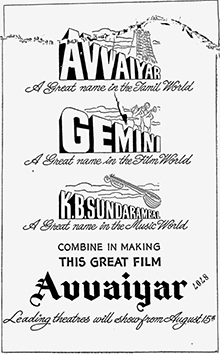
Avvaiyar is a 1953 Indian Tamil-language historical drama film directed by Kothamangalam Subbu, and produced by S. S. Vasan. The film stars K. B. Sundarambal as the title character. It was released on 15 August 1953.
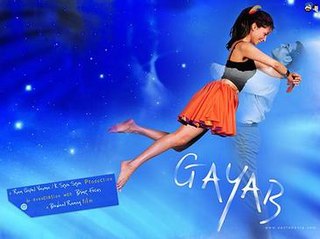
Gayab is a 2004 Indian Hindi-language supernatural black comedy thriller film directed by Prawaal Raman and produced by Ram Gopal Varma. It stars Tusshar Kapoor and Antara Mali as the lead protagonists. The film was declared below average at the box office and was remade in Tamil as Jithan.
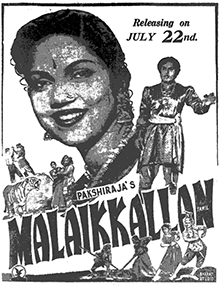
Malaikkallan is a 1954 Indian Tamil-language action adventure film starring M. G. Ramachandran and P. Bhanumathi. The film was released on 22 July 1954, and was a blockbuster. It ran more than 140 days in Chennai and all other major cities. It was the first Tamil film to win a President's Silver Medal. It was the first Indian movie to be remade in five other languages.
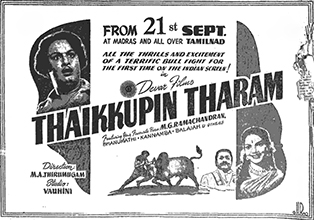
Thaikkupin Tharam is a 1956 Indian Tamil-language film, the directorial debut of M. A. Thirumugam. The film stars M. G. Ramachandran and P. Bhanumathi. It was the first film produced by Sandow M. M. A. Chinnappa Thevar under the then newly-formed Thevar Films. Thaikkupin Tharam was released on 21 September 1956 and ran for over 100 days in theatres.
Devaraagam is a 1996 Indian Malayalam-language film and video directed by Bharathan and starring Sridevi and Arvind Swamy. It also had KPAC Lalitha, Kozhikode Narayanan Nair, Zeenath, and Nedumudi Venu in supporting roles. The film was famous for its music which was composed by M. M. Keeravani. All the songs topped the hit charts. This was the movie in which actress Sridevi came back to Malayalam Industry after a long gap, as she was concentrated on her Bollywood career. Sridevi was reported to do a sequel titled as Sree Sree Devaraagam but the project was shelved post her untimely demise. This was also Sridevi's last Malayalam film.

Thirumal Perumai is a 1968 Indian Tamil-language Hindu mythological film, directed by A. P. Nagarajan. The film stars Sivaji Ganesan and Padmini. It was released on 16 February 1968.

Pudukkottai Ulaganathan Pillai Chinnappa was an Indian actor and playback singer during the 30s era from Pudukottai, India. He is also credited as one of the first major influential actors of South Cinema. His notable movies include Uthama Puthiran, Aryamala, Kannagi, Manonmani, Kubera Kuchela and Jagathalapratapan.
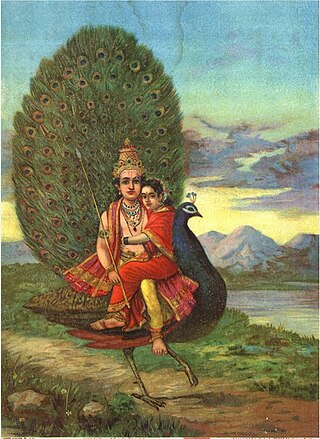
Devasena is a Hindu goddess of aspiration, and the consort of the war god Kartikeya (Murugan). She is also known as Devayanai, Deivanai, and Deivayanai in Tamil texts. Her name is also spelled as Teyvanai or Tevayanai.
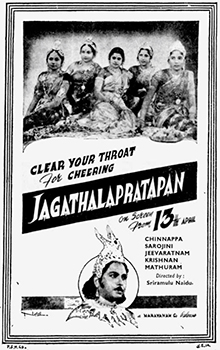
Jagathalapratapan is a 1944 Indian Tamil-language film starring P. U. Chinnappa and M. S. Sarojini. A film adaptation of a folk tale "12 Minister's Tale", the film also features P. B. Rangachari, M. R. Santhanalakshmi and N. S. Krishnan playing supporting roles. The film revolves around the theme of a prince who through his talents wins over several girls and marries them. The film was released on 13 April 1944 and became a box-office success and established Chinnappa as one of the top stars in Tamil cinema.
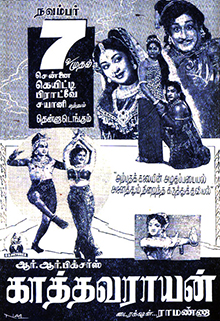
Kathavarayan is a 1958 Indian Tamil-language Hindu mythological film produced and directed by T. R. Ramanna, and written by Thuraiyur K. Murthy. A remake of the 1941 film Aryamala, it stars Sivaji Ganesan and Savitri. The film was released on 7 November 1958.

Nalla Neram is a 1972 Indian Tamil-language film, directed by M. A. Thirumugam and produced by Sandow M. M. A. Chinnappa Thevar. The film stars M. G. Ramachandran and K. R. Vijaya. It is a remake of the 1971 Hindi film Haathi Mere Saathi. All three versions were produced by Thevar. The film was released on 10 March 1972. It emerged a major success, running for more than 100 days in theatres.

Sri Valli is a 1961 Indian Tamil-language Hindu mythological film directed by T. R. Ramanna. Based on the folk tale of Valli, the film stars Sivaji Ganesan and Padmini, supported by T. R. Mahalingam, E. R. Sahadevan, C. K. Saraswathi and J. P. Chandrababu. This film was taken in Gevacolor. It was released on 1 July 1961 and was not successful. The film also featured Lakshmi in her on-screen debut as the child version of the titular character.

Prithivirajan is a 1942 Indian Tamil language film directed by B. Sampathkumar. The film stars P. U. Chinnappa and A. Sakunthala.

Dayalan is a 1941 Indian, Tamil-language film produced by T. R. Sundaram and directed by A. Mithra Das. The film stars P. U. Chinnappa, T. R. Mahalingam and K. V. Jayagowri.

Rangula Ratnam is a 2018 Indian Telugu-language romantic drama film starring Raj Tarun and Chitra Shukla.
Devi Adi Parashakti is a mythological television series based on the Hindu texts of the Shiva Purana, the Devi-Bhagavata Purana, the Markandeya Purana, and pan-Indian folktales of the Goddess. The series was created by Siddharth Kumar Tewary, directed by Loknath Pandey and Manish Singh, and produced by Swastik Productions. Rati Pandey plays the role of Devi Adi Parashakti and her incarnations Goddess Sati, and Goddess Parvati. Tarun Khanna played the role of Devi's husband, Lord Shiva with Kanan Malhotra as Lord Vishnu, Devi's brother. The show also features Sonia Singh as Goddess Diti, the main antagonist.


















